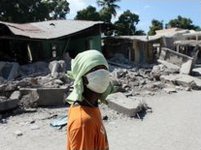 First reports from the epicentre of Tuesday's earthquake in Haiti suggest the damage is even more dramatic than in the capital, BBC correspondents say.
First reports from the epicentre of Tuesday's earthquake in Haiti suggest the damage is even more dramatic than in the capital, BBC correspondents say.They say the scene in Leogane, west of Port-au-Prince, is "apocalyptic", with thousands left homeless and almost every building destroyed.
In the capital, survivors have become desperate as they wait for aid being handed out by international agencies.
But in a sign of hope, rescuers pulled a woman alive from rubble on Sunday.
"It's a little miracle," the woman's husband, Reinhard Riedl, told the Associated Press news agency after she was rescued from a luxury hotel.
The UN says up to 80-90% of buildings in Leogane, about 19km (12 miles) west of Port-au-Prince, have been destroyed.
The BBC's Mark Doyle - who travelled to the town on Saturday - said people had taken refuge in the surrounding sugarcane fields or mangrove swamps.
One survivor said he had come to Haiti from America for his mother's funeral, only for his wife to be killed in the earthquake. He said that so far people in the area had received no help of any kind.
"We don't have any aid, nothing at all," he said. "No food, no water, no medical, no doctors."
David Orr, a spokesman for the UN World Food Programme, said many thousands were feared dead.
"Nearly every house was destroyed here. The military are talking about 20,000 to 30,000 dead."
Many survivors have been leaving quake-hit areas in search of food, water and medicine.
Logistical challenges
UN Secretary General Ban Ki-moon is due to arrive in Haiti on Sunday.
The UN has launched an appeal for $562m (£346m) intended to help three million people for six months, while some two million people are thought to need emergency relief.
“ We need fuel to bring in supplies and carry the wounded ”
Elisabeth Byrs UN spokeswoman
International relief supplies have been arriving at the airport.
There were aid distributions in parts of Port-au-Prince on Saturday, but deliveries have been hampered by severe logistical challenges.
The airport is congested, the port badly damaged, and many roads blocked by corpses and debris.
On Sunday the UN also warned about fuel shortages, which it says could affect humanitarian operations.
"Fuel is the key issue," Elisabeth Byrs, a spokeswoman for the UN Office for the Co-ordination of Humanitarian Affairs, told the BBC. "We need fuel to bring in supplies and carry the wounded."
David Wimhurst, a spokesman for the UN peacekeeping force in Haiti, said aid was being delivered as quickly as possible.
"Aid is going out but it's simply impossible in 24 hours to bring in enough aid to instantly feed all these people, many of whom are in places that are inaccessible," he said.
There are also security concerns amid reports of looting. On Saturday a crowd was reportedly involved in a fight over goods in Port-au-Prince, but a UN official said the overall situation was calm.
Country 'decapitated'
Estimates of how many people died following the 7.0 magnitude earthquake on Tuesday have varied.
The Pan American Health Organization put the death toll at 50,000-100,000, while Haitian Prime Minister Jean-Max Bellerive said 100,000 "would seem a minimum".
A UN official has said aid workers are dealing with a disaster "like no other" in UN memory because the country had been "decapitated".
Three ministers and several senators are reported to have been killed.
Prime Minister Jean-Max Bellerive said his house had been destroyed and he had been sleeping in his car.
"For the moment, we are trying to save our employees who are still stuck under the rubble," he said.
The UN itself lost at least 40 employees in the earthquake, and confirmed on Saturday that the head of its mission in Haiti had been found dead in the rubble of its headquarters.
The US has launched what President Barack Obama called "one of the largest relief efforts in its history" following the earthquake, which killed tens of thousands of people and left many more homeless.
US Secretary of State Hillary Clinton was the first senior Western official to arrive in Haiti on Saturday.
She told Haitians that the US would be "here today, tomorrow and for the time ahead", asserting that "Haiti can come back even better and stronger in the future".
Have you or your family been affected by the earthquake? Are you taking part in the relief effort? If you have any information you wish to share with the BBC you can do so using the form below:
You can also send your pictures or videos to yourpics@bbc.co.uk, text them to +44 7725 100 100 or if you have a large file you can upload here .
Read the terms and conditions
At no time should you endanger yourself or others, take any unnecessary risks or infringe any laws.



